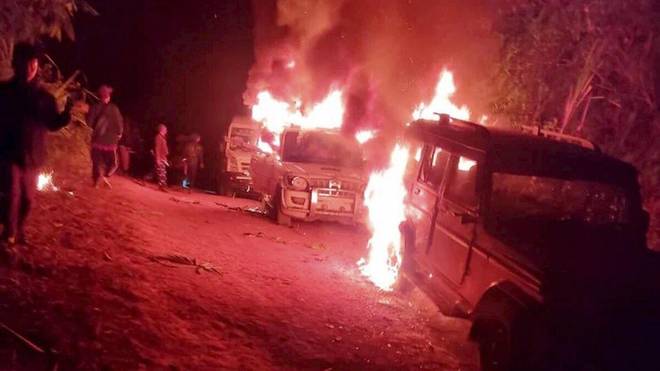The decades-long insurgency problem in the North-East state reached a new tipping point after the Indian Army, owing to mistaken identity, killed 13 civilians in the Mon district of Nagaland on Saturday. The Indian Army on Sunday took responsibility for the incident and assured appropriate action. Following the incident, protests erupted across Nagaland, with a mob of about 500 men attacking and vandalizing a camp of the paramilitary Assam Rifles in district headquarters.
BREAKING: Statement just out from Army’s 3 Corps in Nagaland on the firing incident in Mon district last night: pic.twitter.com/VWOt7I8Z1c
— Shiv Aroor (@ShivAroor) December 5, 2021
While the Army is rightfully coping the blame for its actions, even if inadvertent, questions are once again being raised about the political environment of the northeastern state and its eventual role in the tragedy.
Parallel governments running in Nagaland
National Socialist Council of Nagalim (Isak-Muivah), or NSCN-IM is one of the major insurgent groups operating in the region. The insurgent group for long has engaged in extortion activities by terming it as ‘tax’, also called ‘Nagalim’, and collecting it from the natives on the pretext of using it for the freedom movement of the state.
As reported by TFI, the two factions of the NSCN; the aforementioned IM and the Khaplang factions, both collect taxes at exorbitant rates of 25% and 24% respectively, refusing to which, is not a choice.
Insurgent groups like NSCN have been allowed to keep their arms under the 2015 Peace framework agreement, and consequently, it becomes a life and death situation for the natives if they fail to pay the extortion.
“The insurgent groups — mainly NSCN-KYA and NSCN-IM — have charged a ‘tax’ of Rs 500-1,000 against every shop per year, 2-10 per cent of sanctioned amount against contractors, Rs 3,000-5,000 per vehicle per year, Rs 300-500 per household per year,” an Indian army officer quoted by India Today in July this year said.
Read More: The extortion industry in Northeast India that no national media portal talks about
Presence of such groups detriment to the development of the state
Succinctly put, such rebel groups are running parallel governments in the state while the elected members sit stoically and do nothing to stop the menace of vigilante democracy.
The presence of such groups is the reason why we have seen resistance against highway development projects, as the state of Nagaland more integrated and well-connected with India, is detrimental to the monetary interests of these groups.
New Delhi has always known about but turned a blind eye
The previous governments at New Delhi have also known about the ‘Bollywood-Esque’ extortion culture prevalent in the state and other north-eastern states but owing to certain political calculations, have chosen to keep mum on the issue.
Since the Modi government came to power, it has tried to solve the insurgent issue in Nagaland. In July, six militants of NSCN were killed in a gun battle with security forces in the neighboring state of Arunachal Pradesh in the Longding district.
The action insinuated that New Delhi was no longer tolerating any misadventures of the insurgent group in Nagaland or any of the northeast states.
Army and innocent become the collateral damage in the convoluted political environment
The operation that went awry on Saturday was planned on similar lines after receiving what the sources claim to be credible intelligence. However, something went terribly wrong in the execution that 13 innocent people had to lose their lives.
In the midst of the political dealing between the two parallel governments of the state, it is the Army and the innocents that come out as the ‘collateral damage’.
If the mission goes successful, the army usually receives little to no adulation. On the contrary, they lose their men and get a consolation ‘afterthought’ medal from the government.
However, when the state governments remain lethargic on the issue and do not cooperate with the army, such tragedies unfold themselves. Meanwhile, naysayers of the armed forces receive the required ammo to target the Army, which has nothing but good intentions for its people in mind.
Unlike the IM faction, the NSCN-K insurgent faction operates mainly from Myanmar and the government does not engage in any conversation with it. However, the presence of porous borders with Myanmar allows them to infiltrate across.
The state and centre for years have tried to buy peace in Nagaland but the cracks are starting to appear in this flawed compromise. It’s high time that the centre steps up its role in the region and culls this extortion and parallel government culture. If the authorities do not learn their lesson after such a tribulation, peace will never be established in the North-Eastern state.
